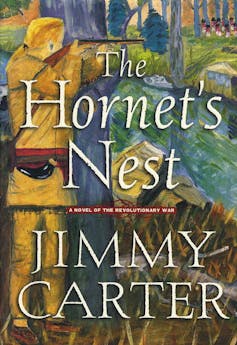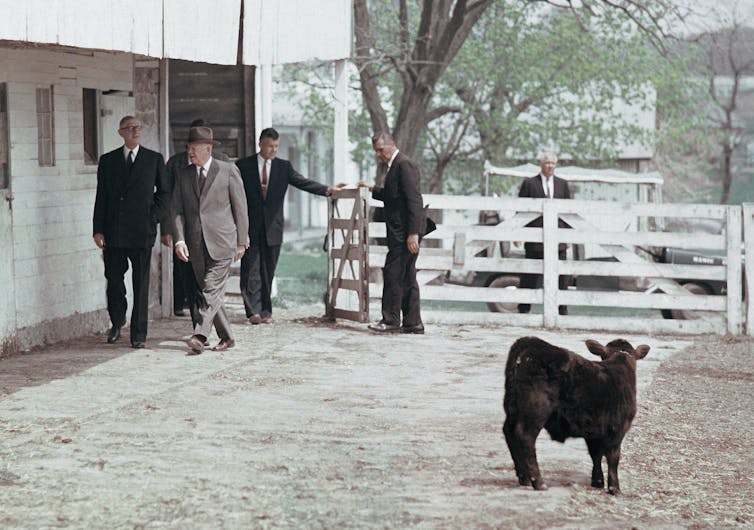In retirement, most ex-presidents can't resist the urge to stay relevant
- Written by Stacy A. Cordery, Professor of History, Iowa State University
“The President is Missing,” Bill Clinton’s new suspense novel that he co-wrote with James Patterson, was swiftly panned[1]. It spills no secrets, the prose is leaden, the story predictable.
 Jimmy Carter spent more years writing ‘The Hornet’s Nest’ than he spent as president.
Simon & Schuster[2]
Jimmy Carter spent more years writing ‘The Hornet’s Nest’ than he spent as president.
Simon & Schuster[2]
Clinton isn’t the first former president to try his hand at fiction. Jimmy Carter took seven years to write “The Hornet’s Nest: A Novel of the Revolutionary War[3],” which suffered a similarly unenthusiastic response.
When it came to their literary ambitions, both Clinton and Carter proved John Quincy Adams prescient.
“There is nothing more pathetic in life than a former president,” the sixth president once opined[4].
What happens to motivated, determined, duty-driven men when they are forced to abandon the White House? When the global spotlight dims? When, as Barack Obama put it, life begins to move in slow motion[5]?
As a scholar of presidential families[6], my research suggests that while presidents have many more options open to them in their “retirement” than the rest of us, they find the transition difficult and their choices have run the gamut from the decent to the disastrous, from altruistic to avaricious.
Getting in the last word
After the daily grind and chaos of being president, it’s no surprise that many presidents, upon leaving office, immerse themselves in quiet activities like writing, painting and farming.
Writing is probably the most common pastime of ex-presidents, who can seldom resist the urge to rehash major events of their tenure, justify their decisions and seek to influence their place in history.
Knowing he was about to die, Ulysses Grant penned his memoir to provide a financial cushion for his family. Bedridden, tormented by pain, and writing on his back in pencil in a desperate race to finish before throat cancer killed him, he completed his manuscript and died days later. It earned nearly half a million dollars for his widow, thanks to the extremely generous royalties[7] granted to him by his friend and publisher, Samuel Clemens.
Theodore Roosevelt’s hunting books[8], Herbert Hoover’s “Fishing for Fun: And to Wash Your Soul[9]” and Gerald Ford’s “Humor and the Presidency[10]” stand in contrast to the many books written by former presidents analyzing foreign[11] and domestic[12] policy, chronicling past eras[13], providing civic[14] and spiritual[15] advice and showcasing public and private correspondence[16].
John Adams grimly rebutted the by then deceased Alexander Hamilton in protracted letters[17] to the Boston Patriot. Even “Silent Cal” found he had a lot to say post presidency, churning out 300 syndicated newspaper columns[18] under the title “Calvin Coolidge Says.”
Painting, meanwhile, acted as a solitary, post-presidential pursuit for at least three former presidents.
Dwight Eisenhower’s landscapes and portraits[19] occupied his last two decades and were exhibited widely. An oil painting of Carter’s netted[20] US$750,000 for charitable works last year, and George W. Bush professes[21] to be both “challenged” and made “happy” by his artwork.
Farming also places high on the agenda of ex-presidents. Like Cincinnatus[22], the powerful fifth-century B.C. Roman leader, George Washington resisted the temptation to remain in power and instead returned to his plow. James Madison, James Monroe, Andrew Jackson, Martin Van Buren, John Tyler, Andrew Johnson, Franklin Pierce, Lyndon B. Johnson and Ronald Reagan, among others, all found solace in going home to their fields and ranches. Eisenhower earned a place[23] in the Angus Heritage Foundation for the prize-winning cattle he raised on his farm near Gettysburg.
 Dwight Eisenhower shows French President Charles de Gaulle around his cattle farm in Gettysburg, Pa.
AP Photo[24]
Dwight Eisenhower shows French President Charles de Gaulle around his cattle farm in Gettysburg, Pa.
AP Photo[24]
The allure of the limelight
But as John Quincy Adams well knew, the glamours and thrills of the old life always beckon.
Theodore Roosevelt may have once written with his customary certainty[25] that “when [the president] goes out of office he takes up his regular round of duties like any other citizen, or if he is of advanced age retires from active life to rest.”
Yet once his term was up, Roosevelt undertook an African safari, started a third party, charted an unexplored river in Brazil, and tried but failed to recreate the Rough Riders[26] for the World War I trenches. George H. W. Bush, who celebrated his 90th birthday[27] by skydiving, recalls this level of derring-do.
Some former presidents turn into elder statesmen, dispensing advice to all who will listen[28], especially presidential hopefuls. They are called upon to attend state funerals, put in appearances, unveil their portraits and accept awards.
Not everyone complies. Millard Fillmore[29] resisted an honorary degree from Oxford University because he felt he did not deserve it. Harry Truman knew he didn’t merit[30] the proffered Congressional Medal of Honor.
Then there are the politicians who simply cannot stop being politicians.
In 1799, Washington set a precedent for inserting himself into future elections[31], when, with the elections of 1800 looming, he persuaded fellow Federalists to run for office and made sure he was solidly apprised of political machinations.
Fillmore, Grant, Grover Cleveland and Theodore Roosevelt all ran for president after leaving the White House. John Quincy Adams was elected nine times[32] to the House of Representatives, doing such good work that he – like Carter – was considered a better former president than president. Seven years after he was impeached, Tennessee sent Andrew Johnson back to the U.S Congress.
“Thank God for the vindication,” he gloated[33] – although his Senate colleagues largely snubbed him.
Many presidents have devoted hours to charitable works, including voluntary military service. Others have tarnished their reputations with exorbitant speaking fees[34] or by vilifying their successors[35].
But only one was truly a traitor. John Tyler became a secessionist[36] and an elected member of the Confederate Congress.
In the end, the desire to reward and punish, to analyze the past, to promote an agenda, to be part of the nation’s business, and to remain in the spotlight proves overwhelming.
Some former presidents may eventually come across as pathetic, but none is ever missing from public view for too long. Ambitious men accustomed to prominence and power find it difficult to “retire from active life to rest.”
Presidents who preceded him have provided Donald Trump several options for his eventual retirement. It is, however, nearly impossible to imagine his Twitter account truly going dark.
References
- ^ panned (www.usatoday.com)
- ^ Simon & Schuster (www.bookstellyouwhy.com)
- ^ The Hornet’s Nest: A Novel of the Revolutionary War (books.google.com)
- ^ once opined (www.theguardian.com)
- ^ life begins to move in slow motion (www.npr.org)
- ^ As a scholar of presidential families (www.stacycordery.com)
- ^ thanks to the extremely generous royalties (www.jstor.org)
- ^ hunting books (www.nps.gov)
- ^ Fishing for Fun: And to Wash Your Soul (books.google.com)
- ^ Humor and the Presidency (books.google.com)
- ^ foreign (catalog.hathitrust.org)
- ^ domestic (catalog.hathitrust.org)
- ^ chronicling past eras (archive.org)
- ^ civic (www.penguinrandomhouse.com)
- ^ spiritual (www.penguinrandomhouse.com)
- ^ public and private correspondence (www.washingtonpost.com)
- ^ in protracted letters (founders.archives.gov)
- ^ 300 syndicated newspaper columns (catalog.hathitrust.org)
- ^ landscapes and portraits (www.c-span.org)
- ^ netted (www.ajc.com)
- ^ professes (www.usatoday.com)
- ^ Cincinnatus (www.britannica.com)
- ^ earned a place (www.angushall.com)
- ^ AP Photo (www.apimages.com)
- ^ written with his customary certainty (glc.yale.edu)
- ^ the Rough Riders (www.nps.gov)
- ^ celebrated his 90th birthday (www.usatoday.com)
- ^ dispensing advice to all who will listen (www.politico.com)
- ^ Millard Fillmore (www.whitehouse.gov)
- ^ knew he didn’t merit (www.nytimes.com)
- ^ for inserting himself into future elections (gwpapers.virginia.edu)
- ^ was elected nine times (history.house.gov)
- ^ he gloated (millercenter.org)
- ^ exorbitant speaking fees (www.nytimes.com)
- ^ vilifying their successors (www.nytimes.com)
- ^ became a secessionist (www.history.com)
Authors: Stacy A. Cordery, Professor of History, Iowa State University

